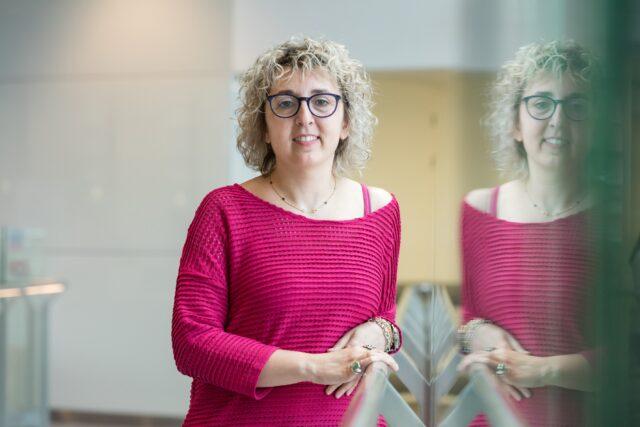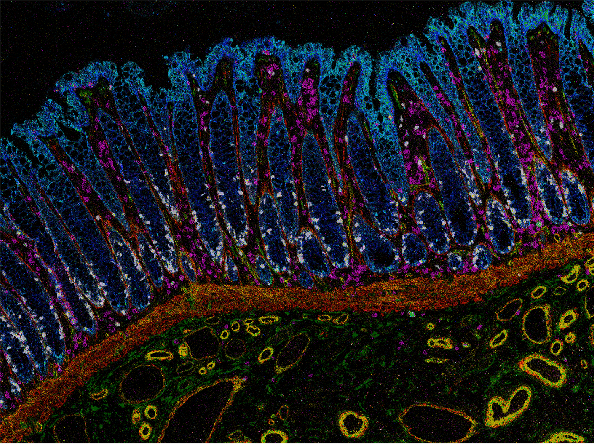Welcoming Professor Francesca Ciccarelli to the BCI
We are delighted to announce that Professor Francesca Ciccarelli will be joining Barts Cancer Institute (BCI), Queen Mary University of London, to lead our Centre for Cancer Genomics & Computational Biology.
Professor Ciccarelli has over 15 years of experience in scientific research, specialising in cancer genomics. She leads a multi-disciplinary team of biologists, mathematicians, oncologists, engineers and computer scientists to apply the latest computational techniques to study cancer biology. She also co-leads the Cancer Evolution theme within the Cancer Research UK City of London Major Centre – a world-class hub for cancer biotherapeutics that unites researchers across the BCI, University College London, King’s College London and The Francis Crick Institute. On joining the BCI, she will maintain her dual appointment with the Crick, facilitating cross-institutional collaboration.

We sat down with Professor Ciccarelli to hear more about her research and her ambitions for her new role at the BCI.
Tell us about your research interests.
My group’s research focuses on how cancer evolves. In particular, we want to understand how changes in cancer’s genetics drive the disease – from how cancer initially emerges, to how it responds to and becomes resistant to therapy. We are especially interested in gastrointestinal cancers such as colorectal and oesophageal cancer, which remain challenging to treat. Currently, only around 1 in 10 people diagnosed with oesophageal cancer in the United Kingdom will survive their disease for 10 years or more.

How do you tackle these research questions?
We apply computational approaches to study tumour samples from patients with cancer. Technical advances now enable us to produce high volumes of rich, high-dimensional data about tumours, painting a detailed picture of their molecular makeup down to the level of individual cells. We then need sophisticated statistical approaches to extract meaningful biological findings from these data. We can use this knowledge to predict the behaviour of tumours to model how cancer will evolve and what the outcome will be for the patient. This will help us to better understand the mechanisms of cancer evolution and will equip us to treat the disease better in the future.
Ultimately, all of our work aims to benefit patients. We collaborate closely with clinicians to analyse clinical trial data to better understand why some people respond to treatments and some do not. This enables us to have a rapid impact, providing insights into how the latest treatments are working as they are tested.
What attracted you to the BCI at Queen Mary University of London?
As co-lead of the Cancer Evolution theme in the Cancer Research UK City of London Centre, I’ve already had the pleasure of working with many colleagues at the BCI, so I’m familiar with the fantastic science underway. The institute creates an extremely supportive and collaborative environment and I’m excited to work closely with colleagues across the BCI, not only within the Centre for Cancer Genomics & Computational Biology – where there is some truly pioneering work happening – but also across the wider institute.
What are your plans as Centre Lead?
As Centre Lead, I want to further strengthen the link between quantitative, computational approaches and the clinic – both in terms of how we analyse clinical samples, but also in how we develop theoretical models to predict cancer evolution. The latter point is something that other groups in the centre are already pursuing, and I think it’s an area with huge potential.
“As Centre Lead, I want to further strengthen the link between quantitative, computational approaches and the clinic.”
— Professor Francesca Ciccarelli
How will your own lab’s research evolve at the BCI?
Over the past few years, my lab has begun to expand its focus to study how factors in the microenvironment surrounding the tumour, such as the immune system, interact with the cancer’s genetics to drive its development. We have progressively become interested in the wider ecosystem around the tumour to understand how tumours and their microenvironments co-evolve. I’d like to explore this area further at the BCI, where I know there is a huge amount of expertise in this area.
What do you like to do in your spare time?
Before I moved to London in 2014, I led a lab at the European Institute of Oncology in Milan, Italy. I am still the academic lead of the PhD in Computational Oncology at the University of Milan, so I regularly spend time there. I also love reading about history and going to the theatre – so that’s often where you’ll find me if I’m not in the lab.
Professor Ciccarelli will be moving to the BCI in August 2023. Applications are now open for an exciting postdoctoral researcher role in her lab. We will be announcing other exciting opportunities to join her team in the coming months. Stay tuned for more details.
Category: General News, Interviews

No comments yet